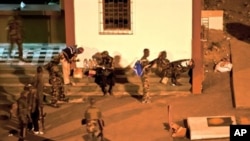Civilians continue to bear the brunt of the conflict in Ivory Coast, with many thousands of displaced people isolated from humanitarian aid. The International Organization for Migration [IOM] said the situation is becoming “increasingly untenable.”
IOM spokesman Jean-Philippe Chauzy said tens of thousands of displaced people are seeking shelter at a Catholic mission in Duekoue, western Ivory Coast.
“More people were being displaced and going towards this Catholic mission, towards the town of Duekoue, in search of security and protection and assistance, of course. We probably have more than 40,000 people now who are in and around this Catholic mission…. We also have information that some of the displaced have gone to a nearby U.N. camp in search of security and of assistance,” he said.
There are also reports that thousands of people had left Duekoue to walk to the town of Guiglo. However, Chauzy said they “apparently seem to be stranded en route and need some assistance. The group apparently includes some vulnerable people, including pregnant women. There again, we are desperate to be able to assist those displaced people in Duekoue and Guiglo, but…access to the region at the moment is incredibly difficult.”
The IOM is sending a team to the region to evaluate the situation. It will then work with U.N. agencies and NGOs to bring in emergency supplies.
Some good news, but not enough
“The good news yesterday (Thursday) evening was that water was available. It hadn’t been before, for at least 72 hours, simply because the electricity in the town [Duekoue] had been cut and therefore the water pumps were not functional within the Catholic mission. Now with electricity back, water pumps are operating and water, potable water, is now available, it seems, for those displaced,” he said.
But food is still in short supply. The IOM says the displaced haven’t eaten for days. It estimates that 80,000 food rations are needed, along with kitchen sets.
“We also have information of people arriving with wounds, including bullet wounds, that deserve urgent medical treatment. And there again, the Salesian fathers, that are in the Catholic mission in Duekoue, are really launching an SOS to make sure that they can get the assistance they need,” he said.
Earlier this week, the IOM said the military offensive by forces loyal to Alassane Ouattara had helped drive the displacement. Ouattara was declared the winner by the U.N. of last November’s presidential election. But Laurent Gbagbo refused to step down voluntarily. Fighting and displacement soon followed.
“That was true earlier this week,” Chauzy said, “Now of course the western area of Cote d’Ivoire appears to be now under the total control of the pro-Ouattara forces. What might happen is that you have enclaves of resistance…probably again populations fearing skirmishes or ambushes.”
Abidjan
The International Organization for Migration has been helping foreign nationals leave the city. But insecurity has made that increasingly difficult.
“We did manage to evacuate about a thousand Mauritanian nationals, but obviously because of the security situation in Abidjan we have suspended the humanitarian evacuation program,” he said.
The evacuation route included traveling through the capital, Yamoussoukro, but the battle for the city has prevented the route from being used.
“We now have to see how the situation evolves in Abidjan. If calm returned to the capital, the need for an evacuation might decrease. On the contrary, if fighting continues or spreads to various quarters of Abidjan, with violence against foreign workers, that would probably trigger important movements of population and increase requests for evacuation assistance,” he said.
The IOM had been asked to evacuate over 50,000 stranded migrants from Ivory Coast to Mauritania, Guinea, Senegal, Burkina Faso and Mali.
The IOM spokesman adds, “We are at the moment hoping for the best case scenario, but also preparing for what could be a worst case scenario.”




